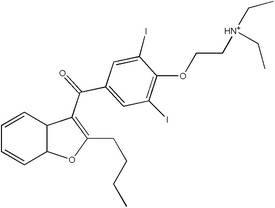TO THE EDITOR: I read with interest the excellent article (1) by Dr. Siddoway on the clinical use of the antiarrhythmic drug amiodarone (Cordarone) that appeared in the December 1, 2003, issue of American Family Physician. The author clearly presented the effectiveness and adverse effects related to this therapy that has been used intravenously or orally to convert and prevent recurrences of cardiac arrhythmias. However, there was no mention in the article (1) of thrombophlebitis, a common complication associated with intravenous amiodarone. (2)
Recent studies (3) have reported rates of phlebitis as high as 16 percent with the intravenous administration of amiodarone. A meta-analysis (4) of 18 randomized controlled trials studying intravenous amiodarone to convert atrial fibrillation reported an 8 percent rate of phlebitis among the 550 patients who received amiodarone. In this systematic review, (4) phlebitis was the most common adverse effect of the drug, followed by bradycardia (4 percent of patients) and hypotension (2 percent of patients).
Thrombophlebitis usually occurs when high doses of amiodarone are infused over a long period in peripheral veins. Thus, to avoid this side effect, the drug should be administered in a peripheral vein for a maximum of 24 hours. Afterwards, the drug must be used orally or a central vein access should be considered. (5) By following these precautions, this minor but frequent complication can be avoided.
REFERENCES
(1.) Siddoway LA. Amiodarone: guidelines for use and monitoring. Am Fam Physician 2003;68:2189-96.
(2.) Aravanis C. Acute thrombophlebitis due to IV use of amiodarone. Chest 1982;82:515-6.
(3.) Vardas PE, Kochiadakis GE, Igoumenidis NE, Tsatsakis AM, Simantirakis EN, Chlouverakis GI. Amiodarone as a first-choice drug for restoring sinus rhythm in patients with atrial fibrillation: a randomized, controlled study. Chest 2000;117:1538-45.
(4.) Hilleman DE, Spinler SA. Conversion of recent-onset atrial fibrillation with intravenous amiodarone: a metaanalysis of randomized controlled trials. Pharmacotherapy 2002;22:66-74.
(5.) Faniel R, Schoenfeld P. Efficacy of i.v. amiodarone in converting rapid atrial fibrillation and flutter to sinus rhythm in intensive care patients. Eur Heart J 1983;4:180-5.
HENRIQUE HORTA VELOSO, M.D.
ANGELO AMATO VINCENZO DE PAOLA, M.D.
VOTCOR-Hospital da Veneravel Ordem Terceira da Penitencia Rua Conde de Bonfim 1033, Tijuca Rio de Janeiro, Brazil 20530-001
COPYRIGHT 2004 American Academy of Family Physicians
COPYRIGHT 2004 Gale Group



